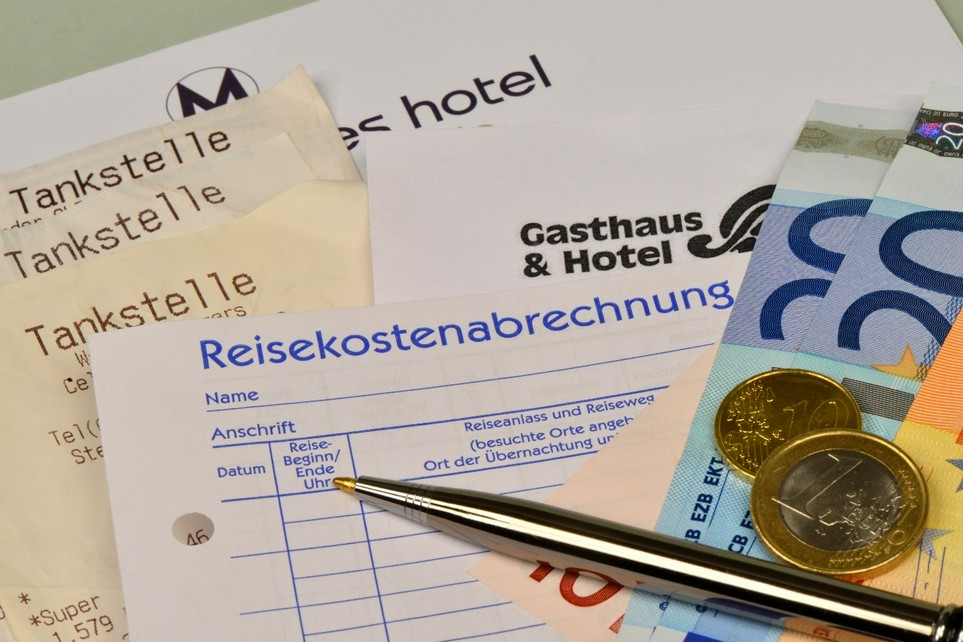How to Deduct Business Trips from Your Taxes
What is legally considered a business trip (Dienstreise)? We'll tell you how to deduct these from your taxes!
Many employees need to make trips to business partners in other cities or even take flights to conferences taking place in different countries. This doesn’t always pose a huge problem if their employer covers travel expenses from business trips, but if they aren’t covered, these costs can quickly add up. If an employee has to pay for their own hotel accommodation, training/seminar fees, airline tickets, etc., they can be claimed on their tax return.
Keep in mind that if your employer pays a portion of these costs, they can no longer be reported on your tax return. Alternatively, these costs can be included if employer subsidies are reported at the same time.
What counts as a business trip?
Expenses for business trips are considered income-related expenses (Werbungskosten) for tax purposes. If an employee temporarily pursues work-related activities at a workplace that is not their standard business practice (usually their company’s address), then this is considered a business trip. Three conditions must be met:
First, this trip must be in the employer’s interest. This includes, for example:
- Trips to the field
- Trips to customers
- Assignment change activities
- Further training/education
- Meetings
- Congresses
- Visits to fairs, exhibitions, etc.
- Research trips
- Expeditions
Secondly, the trip cannot have been made in a company car. Expenses will only be recognized if the trip was made by public transportation, in a rental car, or in the employee’s own car.
Lastly, the only expenses that can be deducted are the ones not covered by your employer.
Deduct travel expenses from your taxes
Travel expenses (Fahrtkosten) incurred from business trips can be claimed as income-related sections on form N of your tax return. One of two possible calculation methods can be used: business travelers can either use the kilometer lump sum (Kilometerpauschale) or base the deduction on the actual incurred costs.
If you travel to your business trip destination using your personal vehicle, 30 cents per kilometer (each way) can be deducted. If your travel expenses exceed 30 cents per kilometer, more can be deducted; however, the costs must be proven in order to do so. You need to be able to prove all costs relating to your personal vehicle and how this corresponds to your annual travel expenses for your business trips, therefore, ensure you hang on to all relevant receipts and keep a logbook of your milage.
If you travel to your business trip destination via public transportation, these can be deducted in full. You will need to prove these costs, so hang on to your bus, train, or cab receipts.
By the way, instead of as income-related expenses (Werbungskosten), self-employed persons must deduct their travel expenses as business expenses (Betriebsausgaben). The sales tax on business travel expenses is deductible as input tax (Vorsteuer).
Room & board expenses
If your business trip lasts several days, you can claim 28 euros per full working day on your tax return. As of 2020, 14 euros (previously 12) can be deducted for day trips that last at least 8 hours, this amount also applies to arrival and departure days during longer stays. Truck drivers can also now claim an overnight allowance of 8 euros per night spent in their own vehicle.
Overnight expenses (e.g. in a hotel) can be claimed in full. The flat rate already covers costs for meals, so these costs must be deducted from the hotel bill total. More information on additional meal expenses can be found here.
Tip: Always keep your invoices, receipts, and vouchers as the tax office (Finanzamt) may request them. The tax office requires itemized receipts for accommodation costs, but this is unnecessary for additional meal and subsistence expenses.
Professional travel abroad
Different lump sums (foreign lump sums) apply to different countries that you travel to for professional reasons. The current foreign lump sums can be found here (German).
What other costs can I claim on my tax return?
- Admission tickets (e.g. to trade fairs)
- Tips
- Tolls and parking fees
- Public transit tickets
- Costs for rental cars or cabs
- Expenses for business phone calls
- Luggage insurance
- Baggage fees
Employees on business trips aren’t the only ones that can deduct travel expenses. Others include:
- Landlords traveling to their properties
- Job applicants traveling to a job interview
- Employees with two households (double household maintenance) can deduct a maximum of 46 trips between residences per year (once per week minus 6 weeks of vacation)
Do you have travel expenses that you wish to deduct? File your tax return now!
